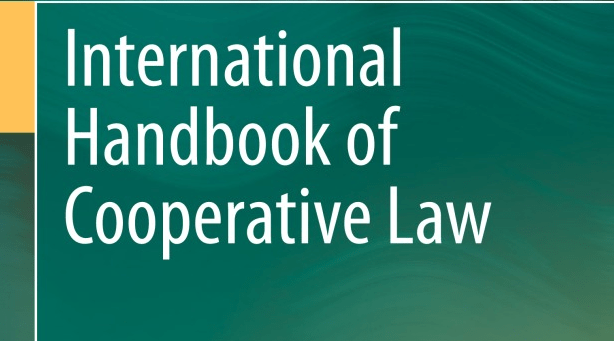
A recently published International Handbook of Co-operative Law provides guidelines as to how the seven co-operative principles can be translated into legislation.
The book examines and frames the state of legislation regarding co-operatives, in an international and comparative perspective and is the result of a "co-operative effort". The three co-editors of the book, Professor Antonio Fici of the University of Trento, Professor Dante Cracogna of the University of Buenos Aires and Hagen Henrÿ, Research Director of the University of Helsinki Ruralia Institute, have worked with 35 legal scholars from all over the world.
Prof Fici, who teaches Co-operative and Social Enterprise Law, said that the book also aimed to give law a more significant role within the overall co-operative theory.
“Without adequate legislation and a developed co-operative legal doctrine, co-operatives would be limited in their growth and would face obstacles hard to overcome”, he said.
Only two similar works have been published before, one in 1933 by Plunkett Foundation, and another one in 1954 by the ICA. The handbook is different, argues Prof Fici, because it strives to establish a theory of comparative co-operative law, while taking into account supranational legislation.
According to him, national jurisdictions that do not conform to the seven co-operative principles continue to exist. The first chapter of the book looks at co-operative identity, examining the common nucleus that can be found in all co-operative laws. It provides an analytical and conceptual framework to understand the complexity of co-operative law.
Co-operative legislation can appear as a single instrument that deals with co-operatives, such as a co-operative act or code, in several instruments dedicates to co-operatives only, or in a more general instrument such as a civil core or company code. There are also special laws for particular types of co-ops.
The book states that co-ops should not in principle be subject to the law of other business organisations, especially companies, if their distinct identity is to be protected by and within a legal system.
Co-operative laws comprise of mandatory rules and non-mandatory rules. However, a relaxation or reinterpretation of some co-operative principles has led to a third category of provisions that may be termed “options”. These enable co-operatives to choice from two or more alternative specific rules.
“Relaxation or reinterpretation of cooperative principles are therefore possible but should be handled with care. We hope that our Handbook, by enriching the cooperative legal culture, might also contribute in this direction,” said Prof Fici.
The challenge for legislators consists in improving the competitive disadvantages of co-operatives without diluting their distinctive features and to strengthen those distinctive features, which constitute the comparative advantage of co-operatives.
The book looks at different regions, while examining the existing legislation within 31 individual states. It also deals with the tax treatment of co-operatives across various states.
“In the book we conclude that co-operatives do deserve a specific tax treatment, which however cannot be considered a privilege,” thinks Prof Fici.
“In fact, the principle of equal treatment requires that different situations be treated by law in different manners. Therefore, given that co-operatives are diverse from for-profit capitalistic companies, they deserve a differential treatment, a specific treatment, also under tax law.”
The book can be ordered online.




